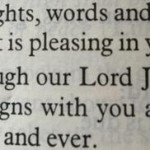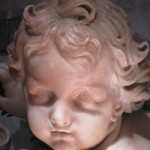Originally posted July 8, 2005
LISTEN…
LISTEN…
It is the first word of the Rule of St. Benedict.
Listen carefully, my son, to the master’s instructions, and attend to them with the ear of your heart.
It is such an important word – such good advice – advice I have often been to slow to take, too noisy to comprehend. Chattering on and on to God about what I thought about things, it took a long time to learn to listen. I am learning, still.
Over the past few months, I have been listening to many doctors as they have been giving me one dollop of bad news at a time. But I think only yesterday did I hear.
What I heard was the sound of a limit being met. The sound of a camel’s back breaking in two.
There have been some horror stories in my life, but I have never blamed God for them.
I have not always been a good Christian, or even a good person – I have done terrible, dark things in my day, things for which I have humbly begged forgiveness. I have never believed that I was owed some slack for my behavior simply because of the nearly Dickensian situations of my earliest years. I certainly know what I have done and, as the psalmist says, “[my sin] is ever before me.”
I also know that often our sin has a wider effect than we realize – broadening and stretching out to touch other lives, lives of which we may not even be aware – just as a pebble thrown into a pond can sometimes stir the water to its very edge. We live, none of us, to ourselves.
I know that what goes around comes around. I know there is Karma. I also know what the prophet Isaiah has said – that God has “rescued me from the pit of destruction, when you cast my sins behind your back.”
And because I know these things, and because I am inordinately aware of how many blessings I have received, I have never spent time railing at God like a fishwife, demanding to know why, so often, the short straw has seemed to fall my way.
We all draw them, from time to time, of course, the short straws. But yesterday morning, it seemed like I had drawn one straw too many.
I had been alright with the “severe anemia” straw. Not the worst thing in the world, after all.
The recent “skin cancer” straw was a little scary, but I appreciated how much worse it could have been, and I am certainly very aware, now and attentive.
Yesterday morning, though, came a straw I have dreaded my whole life, and I finally drew it: the “you are losing your hearing” straw.
I knew I’d been missing some conversation in noisy restaurants…
The loss was discovered, of course, due to that dismal ear infection of the past two weeks, but the hearing in that afflicted ear is only slightly worse than the other. Upon reading my test results the doctor asked if I had worked around airplanes for the past 20 years, or if I had fronted a rock band. “severe degeneration…hearing aids…”
My grandparents were deaf. My birth-father was cupping his ears in his fifties.
But, of course, the degeneration may not be congenital, at all.
“The autoimmune problems you have from the Lyme Disease could be the reason for it…”
Short was the straw. Crrrraaaack! Went the camel’s back.
Lyme Disease. I had it for a long while before it was diagnosed, long enough for it to affect me neurologically and otherwise. It has changed my life in every possible way. Now, perhaps, it is stealing my hearing.
I drove home pounding the steering wheel and telling God I thought He was pretty damned unfair, after all. I demanded that He listen to me and make me a sensible answer about why things were going as they were, why at only 46 years of age I was increasingly debilitated, increasingly arthritic, increasingly feeling like a 65 year old.
“It’s not enough that I must sometimes use a cane, or that I wear glasses, not enough that I am constantly bruised, often fatigued into stupidity and inarticulate, stammering aphasia, not enough that my body is scarred all over and that my skin is under seige simply because I am Irish…now I am going to need hearing aids? Now I am going to be deaf? What has my husband ever done to you, that you need to inflict this sort of wife upon him?”
Oh, I howled. I ranted.
And it was so out of character for me to do so – this has not been my way, to shake an angry fist at God and make demands. I didn’t like doing it – it felt so wrong. So wrong, not to simply be thankful for my blessings…for all the good things, and all the “not too bad” things.
But I was so angry.
And then, I remembered that my sons are both musicians. And I wept.
It’s cruel, too cruel. I’ve appreciated irony all my life. But my sons are both musicians. And I am going deaf.
Maybe I will never hear my elder son’s compositions. Maybe Buster’s jazzy riffs will only come through as an occasional toot and wail.
Maybe I will only hear my grandchildren laugh in my imagination. Assuming I live long enough to see grandchildren.
Yes…I became that downtrodden, that blue; I started wondering about mortality.
We can do such numbers on ourselves, sometimes. We can willfully shatter our own spirits, plunge ourselves into a bleak, lugubrious brood of misery, and we can do it so quickly…particularly if we are unwilling to listen.
Driving Buster to work last night, I told him what was going on and gave him a taste of my “it’s not fair,” rant. He was, as ever, thoughtful and sympathetic. And fast with a response, too, one I needed to hear.
“Ma, listen,” Buster said, “don’t you remember about Job? Remember how heavy his afflictions were, and how he was tested…”
“Screw Job, I’m not Job,” was my heated response. “I’m not some great model for mankind, here, and there is no greater purpose being served…”
But Buster’s arrow had hit the mark, and by the time I pulled into the parking lot my head was bowed in shame, because I knew better. “I know that everything works to God’s purposes, I know it.” I admited to my son. “But this sucks. Why is all of this happening to me? Why is all this crap being piled on? Not that I want it all to happen to someone else, God forbid! But why does it have to be me? I feel like my body is falling to pieces and I’m…I’m just so angry!”
“Ma…what have you told me, all my life? God always uses the imperfect – the weak and humble and broken things to strengthen and build up and heal the world.”
“I’ve never said that!” I sobbed.
“You say it all the time!” Buster laughed. “You point it out all the time! About King David, St. Peter, St. Bernadette, John Paul II, Terri Schiavo, President Bush, heck, even the Agnus Dei, the Lamb of God was first made weak, humbled and broken…”
“Well, I’m not any of them!”
“No, you’re not,” he agreed, smiling as he got out of the car and walked around. Leaning in to give me a kiss, he said, “you’re not any of them, and you don’t have their greatness, you’re just an insignificant woman in a small suburban town…but in your little world, your broken little self can be used for something good, if you let Him use it. Maybe you should stop complaining and listen. Maybe all that silence in your future is so that you can hear something else.”
The little bastard! Stopped me right in my tracks, like a wise and elderly monk who has no time for circuitous council and goes right to the heart of the matter.
When did he get so smart?
Like Job, I understand that what is occuring is not punishment for sin.
But I have been much blessed. And I have sinned much. Grace abounds, of course. But maybe there is some cosmic balance here that I will only understand in a different, altered state. Or maybe what I look at as affliction is another sort of blessing – if all of this is useful, in some strange way, to God, then what greater blessing can there be than to be allowed to be of use to Him, even in ways we do not understand?
In one of those weird co-incidences that seem so providential, sometimes, a reader with whom I have never corresponded before wrote to me out of the blue, about the same themes that were going ’round in my head. The last thing he wrote was this:
Fr Nouwen reminds us of how the Eucharist defines our life.
First Christ takes us as we are.
He blesses us.
Then He breaks us.
And gives us to the world to bless.
He and Buster were on the same wavelength, it seems.
In Rumer Godden’s novel, In This House of Brede, a nun notices a notepad upon which her abbess, severely tried by the actions of others and wishing she could be uncharitable, has scrawled, “there can be no limits.”
In another part of the book, a nun who has entered after a life of heavy secular responsibilities scorns an admonishment to be more willing, more open, to what is required of her. “I have done my stint,” she says.
“Your stint,” an older nun replies, “that sounds like a measure.”
“It is a measure,” the first nun says, “my full share.”
“I think you will find,” the older nun councils, “that God does not work in measures.”
Perhaps that is the message that Buster was delivering yesterday. I had declared the camel’s back broken, the strawbaskets full. I had had my share of bad news, had “done my stint.”
But there can be no limits.
St. John of the Cross and St. Teresa of Avila have both written of the “Dark Night of the Soul.” Mother Theresa of Calcutta and St. Therese of Lisieux wrote a little on it, as well. It seems to be a particularly scathing sort of dryness and loss that occurs at the unbreechable chasm between human and divine love. The suffering is very great. The blessing seems to be in that one only gets to that point – to that dark night – when one has advanced so far in love and in faith as to have perhaps exceeded human understanding…when perhaps all there is left is the ability not to praise or to do, but to simply be, and to be willing – humbly willing – to simply listen and be led, even to where – like Peter – you would rather not go.
It is the Pauline paradox. When I am weak, then I am strong. When I have nothing left to offer, then I will finally simply allow You to take what You need. When I have finally gotten out of my own way, I will have gotten out of Yours, as well, so that you might strew me where you will, broken and scattered and meant for something beyond my imagining.
This, I suppose, is another mystery of suffering. When I was a child I once heard a woman talk about her son’s severe and unusual illness and how a nun, upon learning the details, said to her, “my dear, how God must love you to allow you to suffer so…”
At the time I thought the nun rather perverse. This idea of God demonstrating his love by allowing the loved one to suffer seemed dubious and theologically unsound. But as I get older, and look around a bit, I wonder if the old nun was not on to something. Often great blessings and great sufferings abide within the same single life, and it was ever thus.
My sufferings are not great. “Placed in the balance, they rise…” Placed in perspective, everything can be dealt with. Whenever I have encountered a task that seemed terribly difficult, I have usually discovered that the hardest part of the job was in simply doing the work, applying myself to it with my whole heart and attention…which is another form of being, when you come right down to it. The biggest limitations have been the ones I have placed before myself.
I am losing my hearing. We will know more next month. Perhaps the degeneration will be slow. Perhaps not.
The Lord giveth and the Lord taketh away; blessed be the name of the Lord.
And, as Will Shakespeare once wrote…the rest is silence.
There can be no limits. There is only one measure, and it spans a lifetime and it touches the Divine.
I know that I am not done listening. Not by a long shot.











